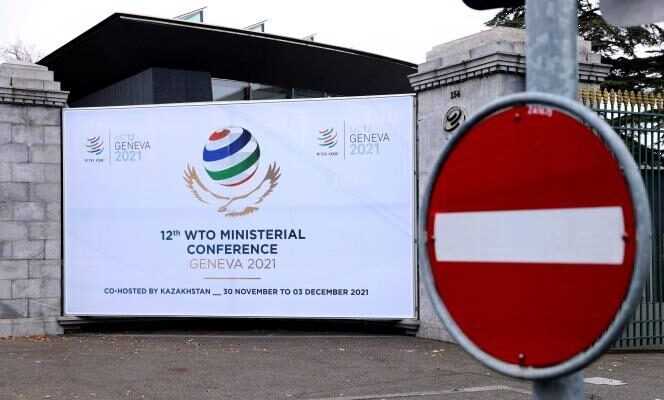The World Trade Organization (WTO) had to postpone at the last minute, Friday, November 26, its first ministerial conference in four years in the face of the resurgence of the Covid-19 pandemic, showering hopes of reviving the very weakened organization .
The WTO is the first international organization in Geneva to bear the brunt of the fifth wave of the Covid-19 pandemic. All eyes are now on the World Health Organization (WHO), whose 194 members are to debate for three days next week a possible pandemic treaty.
The holding of two other major meetings – one on sustainable finance, the other on lethal autonomous weapons systems – could also be at risk, following the travel restriction measures announced by Switzerland to do so. faced with the appearance of the new variant of the Omicron coronavirus, making it impossible for many delegations to come to Geneva. This variant has been classified “Worrying” by the WHO a few hours before the postponement of the ministerial.
“All members supported the decision”
The ministerial, which was to bring together from November 30 to December 3 at the headquarters of the organization about 4,000 participants, including heads of state and more than a hundred ministers, should have been held in Kazakhstan in June 2020, but had already postponed after the appearance of the first cases of Covid-19 at the end of 2019.
Ministerial meeting “Was postponed, and all members supported the decision”, tweeted Anabel Gonzalez, deputy director of the organization, confirming the information that a diplomatic source had given to Agence France-Presse (AFP).
British Ambassador Simon Manley called “Wise” the postponement, while the European Ambassador to the WTO, João Aguiar Machado, acknowledged that “It was not an easy choice, but the right decision”.
The relative calm of the pandemic in recent months in Europe had given reason to believe in the holding of the meeting. But the rise of the fifth wave of the epidemic around the world and the appearance of the Omicron variant has dampened those hopes.
“Bad outlet”
It was the first ministerial of the Director-General, the Nigerian Ngozi Okonjo-Iweala, who arrived in March, which everyone has greeted since the relentless desire to restore visibility to the WTO, in a context of crisis and growing rivalries between the two leading world economic powers: China and the United States. This first test of the reality of his influence was all the more important since the previous ministerial in Buenos Aires had ended at the end of 2017 without a significant agreement. Since then, the files have piled up.
Many observers found it difficult for the 164 members of the WTO to be able to conclude large-scale agreements during this 12e Ministerial, particularly on fisheries and the issue of intellectual property rights during the pandemic. But many remained hopeful that the meeting would at least break the deadlock on the discussions.
“A ministerial conference offers the possibility of finding political solutions to questions for which technical solutions alone are not sufficient”, reacted to AFP Dmitry Grozoubinski, director of the organization Geneva Trade Platform.
This conference was also due to take place at a time when the WTO – where decisions are taken by consensus – has lost its relevance because it is unable to conclude major agreements and settle disagreements between certain members and China. In addition, the main instrument for settling disputes between its members – the appeals body – is paralyzed for lack of judges. The administration of US President Joe Biden has said it is ready to relaunch it after the blockage of the Trump years, but without a concrete proposal.
“There was little optimism about the outcome of the negotiations over the next few days, but this suspension is a bad outlet and prevents us from emphasizing that the non-engagement of the United States encourages the inertia of a difficult reform of the United States. ‘WTO’, told AFP Elvire Fabry, researcher in charge of trade policy at the Jacques Delors European Institute.
